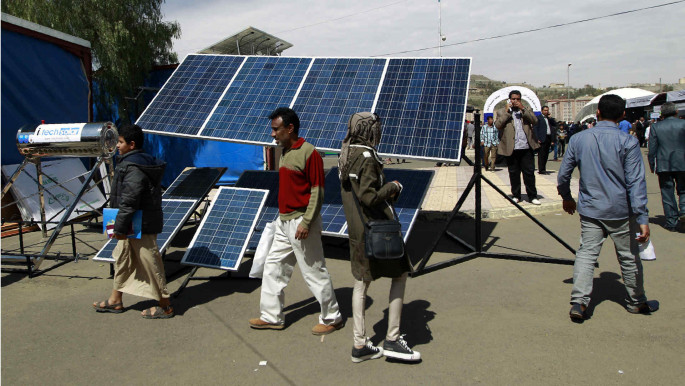Khalid Al-Karimi is a freelance reporter and translator. He is a staff member of the Sanaa-based Yemeni Media Center and previously worked as a full-time editor and reporter for the Yemen Times newspaper.
Follow him on Twitter: @Khalidkarimi205
Opinions expressed in this article remain those of the author and do not necessarily represent those of The New Arab, its editorial board or staff.
Seeing the light: Yemenis seek independent solutions to roaming blackouts
Since after the breakout of war in Yemen, Um Haitham's family has not watched the TV once - or even operated the electric washing machine.
"It is miserable to live without electricity. We live a life not knowing anything about what is happening out there in the world," said the 45-year old woman.
The electricity crisis is but one of a large number of similar problems affecting a country ravaged by a bloody war since early 2015.
"Before the war, the power outages used to last a few hours. Nowadays, months and years go by without an electrical current in my home," said Um Haitham.
"The solution lies in solar panels," she added.
 |
Now I can charge my mobiles, switch the lamps on and my sons can charge their laptops - we can live without government electricity |  |
Yemen slid into chaos in the wake of a political deadlock in 2014. In March 2015, Houthi-backed militants and other allied forces placed the Saudi-backed president, Abd Rabu Mansour Hadi, under house arrest, along with many government officials.
This event led to the country's near-two year civil war, leading gradually to the breakdown of many public services, including schools and hospitals. The closure of the latter helped trigger the start of the most deadly cholera outbreak in recent history.
"The people in Yemen have forgotten about electricity provided by the government," said Mohammed Al-Jumaei, a Yemeni economist.
"Seeing this situation, citizens have adopted other tools to generate electricity. Solar panels are used extensively - especially in Sanaa, Taiz, Ibb, Hodeida and all Houthi-controlled territories, including rural areas."
Crisis overcome by the sun
Saleh Ahmed, a father of seven, has been living in Sanaa for 16 years. It has been only one year since he began using the solar panels.
"Before I bought the solar panels, I used to light candles every night," the 50-year old told The New Arab.
"Now, it is comfortable to switch the lights on when the night comes. The solar power has solved the electricity problem in my house."
Solar panels have been a rising business in Yemen. As the government has not addressed electricity production due to the ongoing war, the people have had no option but to opt for the solar solution.
A Ministry of Electricity and Energy official told The New Arab in January that at least 40 percent of people in Yemen today are relying on solar energy.
Read more: Yemenis turn to solar energy amid electricity blackouts
 |
|
| Yemenis looking at solar panels at Sanaa university [AFP] |
"I put the panel on the roof of my house, connecting it to the battery in my room. Now I can charge my mobiles, switch the lamps on and my sons can charge their laptops - we can live without government electricity," said Ahmed.
"I spent 50,000 Yemeni Rials (about $150) to buy a solar panel, battery and other relevant items.
"It was a financial burden, but the dark nights were a bigger burden," Ahmed added.
35-year old Nabil Abdulla in Sanaa used to have a cosmetics shop. Today, the shop sells solar panels.
"There has been a great demand for the solar panels in Yemen. Some people only need to charge their mobiles or laptops: They can buy a small panel and get their power problem solved,' added Abdulla.
Though the solar panels are an effective power alternative, a lot of people have experienced a tough financial situation in Yemen. Since September of last year, the government employees, estimated over one million, have not received their salaries.
"Millions of families rely on the government salaries, and they cannot manage to buy the solar panels now. They remain in the dark," said Abdulla.
While the war rages on in many areas in Yemen, the solar panels continue to find their way into the country, mainly coming from China and India.
Prior to the chaotic civil war, the Marib Power Plant was a major electricity supplier in Yemen. This plant no longer supplies power to many areas of the country.
Good for business?
Ez Al-Deen Albadani, an owner of a clothes shop, said his business has been struggling for three years. "The power shortage has affected a lot of businesses because the bulk of businesses hinge on the availability of electricity."
This availability cannot be completely met by solar power alone however, as the power provided is limited in strength.
"I lately resorted to buying solar panels to light the shop only. But the sewing machines need a strong current. I have been using petrol-run generators to operate them," Albadani said.
 |
Nowadays, months and years go by without an electrical current in my home |  |
A fuel shortage in Yemen has created a black market however, adding to the suffering of all - except those who capitalize on the crisis.
After almost three years of political turmoil and fierce fighting between the Houthi groups and Saudi-backed forces, Yemen has been termed as the worst humanitarian crisis in the world. According to UN reports, 20 million people are in need of humanitarian aid and seven million people are on the brink of famine.
The electricity crisis is one picture in a series of miseries in Yemen.
"We hope this war will end soon so that light and peace will return to our houses and country," said Albadani.





 Follow the Middle East's top stories in English at The New Arab on Google News
Follow the Middle East's top stories in English at The New Arab on Google News


